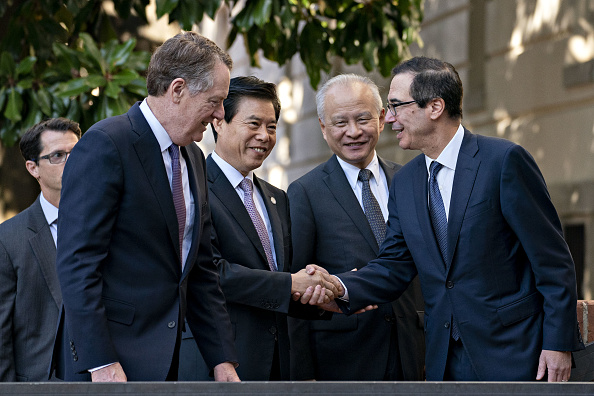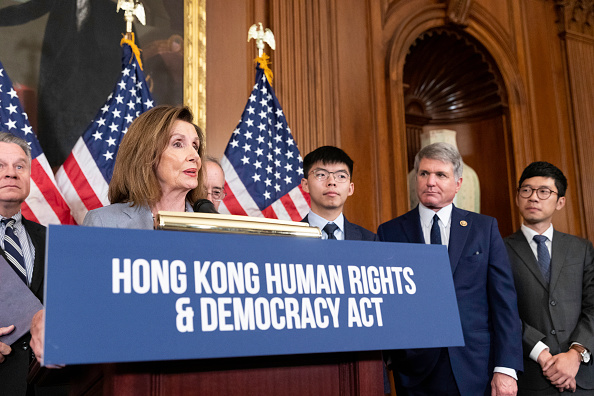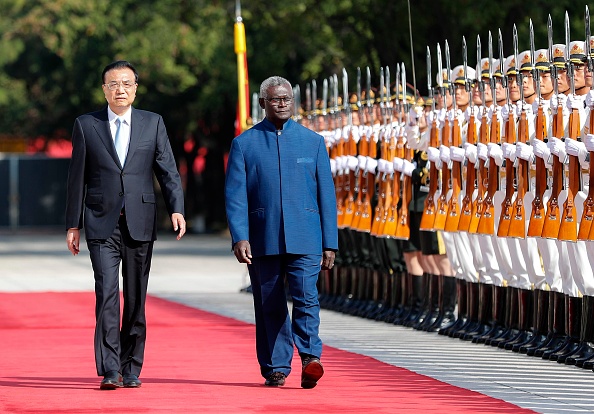
 Economic Shudders
Economic ShuddersThe global economy is slowing due to the US-China trade war, and gloomy forecasts show that 2019 global growth will grind to its slowest pace since the 2008-2009 financial crisis. As the world sits at the brink of a global recession, the International Monetary Fund says that a joint removal of trade war tariffs would stem economic losses and output would rebound.
China's economy is one of the main sufferers, as it grows at its slowest pace in three decades. The trade war and U.S. tariffs are just one of a host of problems facing China's growth prospects, as the automotive sector contracts, real estate slows, and a swine fever epidemic continues to plague China's pigs.
Meanwhile, a "Phase 1" trade deal between the US and China is nearing completion, as negotiators in both countries nail down a mutually beneficial deal for the two Presidents to sign next month at the APEC Summit. US Treasury Secretary Mnunchin said that the deal would include protection for US companies from intellectual property theft, a charge that Beijing has denied. More negotiations are likely in the cards, as Beijing wants Washington to cancel a planned tariff hike in December, as well as one for this week.
 A House United
A House UnitedThe U.S House of Representatives passed a "pro-democracy" bill in favor of the Hong Kong protests that have convulsed the city for months. The bill, called the Hong Kong Human Rights and Democracy Act, affirmed American support for the protesters' demands, and would end the city's special trade status if Hong Kong isn't found to be sufficiently autonomous. The move irked Beijing, who called it "arrogant and dangerous." The bill also called for the US president to place economic and travel sanctions on people who abuse human rights in Hong Kong. China's Foreign Ministry Spokesperson Geng Shuang said that if the "act were to become law, it would not only harm China's interests and China-US relations, but would also seriously damage US interests."
On the other side of the Pacific, Speaker Nancy Pelosi said, "If America does not speak out for human rights in China because of commercial interest, then we lose all moral authority to speak out for human rights anyplace in the world." After passing the House with a rare showing of broad bipartisan support, it will now move to the Senate, where it will likely pass before being presented to President Trump to sign before it becomes law.
 Strategic Outpost
Strategic OutpostResidents of Tulagi, an island in the Solomon Islands that was once the seat of British colonial rule in the Pacific, have learned that an agreement has been signed to lease their island to Chinese firm China Sam Enterprise Group, and it will likely be developed into a Special Economic Zone. According to media reports, the firm has secretly negotiated the exclusive rights to develop the island, as well as its surroundings, which may also benefit China's economic, military, and political goals.
Washington views the island archipelago as essential for curbing Beijing's ambitions in the region and keeping sea routes open, and officials are deeply concerned that the island could be used as a military post. This news follows the Solomon Islands' severing of ties with Taipei, in favor of stronger China relations.
When asked about the leasing, Foreign Ministry Spokesman Geng Shuang said that while he had no knowledge of the situation, "the Chinese government encourages Chinese enterprises to conduct overseas business cooperation in accordance with market principle and international rules and on the basis of abiding by local laws."
Prepared by China-US Focus editorial teams in Hong Kong and New York, this weekly newsletter offers you snap shots of latest trends and developments emerging from China every week, while adding a dose of historical perspective.
- 2019-10-11 A “Big Day of Negotiations”
- 2019-10-04 Birthday Celebrations
- 2019-09-28 A World Split in Two?
- 2019-09-20 Another Round
- 2019-09-13 Olive Branch or Olive Twig?
- 2019-09-07 The Unwinnable War?
- 2019-08-31 “Sorry, it’s the way I negotiate”
- 2019-08-23 Tit for Tat
- 2019-08-17 Slowdown Ahead?
- 2019-08-09 Yuan on the Rocks
- 2019-08-02 Ratcheting Up the Crisis
- 2019-07-26 Playing Defense
- 2019-07-19 “Stain of the Century”
- 2019-07-12 Whichever Way the Wind Blows
- 2019-07-04 A Gentlemen’s Agreement
- 2019-06-28 A Truce on the Horizon?
- 2019-06-22 Three’s A Crowd
- 2019-06-14 Battle for Hong Kong
- 2019-06-07 Panda Diplomacy
- 2019-05-31 Trade Diversions
